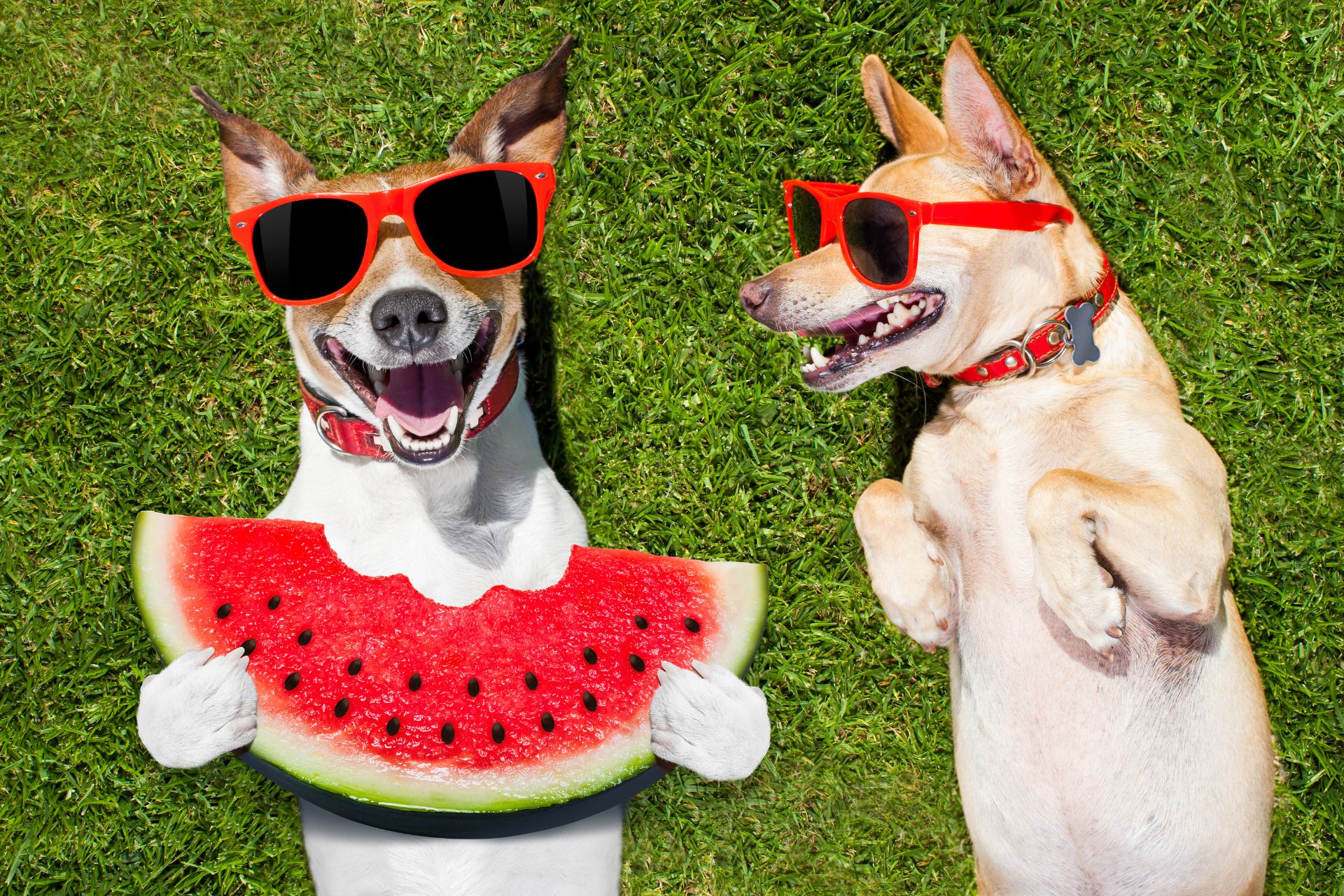Are you tempted to share your fruit with your dog? Do you think that giving your dog some fruit is a good way to improve their health and nutrition? If so, you’re not the only one. Many dog owners like to feed their dogs fruits as treats or supplements, believing that they are safe and beneficial for their canine companions.
However, not all fruits are suitable for dogs. While some fruits can offer your dog vitamins, minerals, antioxidants, and fiber, others can be toxic or harmful for them. Some fruits can even cause serious health problems or even death in dogs.
So how do you know which fruits are safe and which are dangerous for dogs? And which fruits can you safely feed them? In this article, we’ll answer these questions and more. We’ll explain the benefits and risks of feeding fruits to dogs, and provide you with a list of the best and worst fruits for dogs. We’ll also give you some tips on how to feed fruits to dogs safely and moderately.
By the end of this article, you’ll have a better understanding of what fruits can dogs eat and what fruits can dogs not eat. You’ll also learn how to make your dog’s diet more balanced and healthy, without compromising their safety or well-being.
- How to Feed Dogs Fruits Safely and Moderately
- What Fruits Can Dogs Eat?
- What Fruits Can Dogs Not Eat?
- What Fruits Should Dogs Eat Sparingly or Occasionally?
- Conclusion
- FAQs
How to Feed Dogs Fruits Safely and Moderately
Before we dive into the list of what fruits can dogs eat, let’s first talk about how to feed dogs fruits in general. After all, fruits are not a natural part of a dog’s diet, and they may not be suitable for every dog.
Dogs are omnivores, which means they can eat both animal and plant-based foods. However, they are primarily carnivores, which means they need meat as their main source of protein and energy. Unlike humans, dogs do not need fruits as part of their balanced diet. In fact, too many fruits can cause digestive issues or nutritional imbalances in dogs.
That doesn’t mean that you can’t feed your dog any fruits at all. Some fruits can be a great addition to your dog’s diet, as long as you follow some general guidelines:
- Wash the fruits thoroughly before feeding them to your dog. This will remove any dirt, pesticides, or bacteria that may be harmful for them.
- Peel or core the fruits before feeding them to your dog. This will remove any seeds, pits, stems, or skins that may be hard for your dog to digest or cause choking hazards.
- Cut the fruits into small pieces or slices before feeding them to your dog. This will make them easier to chew and digest and prevent choking hazards.
- Serve the fruits plain or mixed with your dog’s regular food. Do not use fruits as a substitute for your dog’s main meal. Fruits should only make up 10% or less of your dog’s daily calorie intake.
- Introduce new fruits gradually and monitor your dog’s reaction. Start with small amounts and increase them slowly over time. Watch out for any signs of allergies or intolerance, such as itching, vomiting, diarrhea, or gas. If you notice any of these symptoms, stop feeding that fruit to your dog and consult your vet.
What Fruits Can Dogs Eat?
Now that you know how to feed dogs fruits safely and moderately, let’s take a look at some of the common and safe fruits for dogs. These fruits can offer your dog some extra nutrients and health benefits, as well as some variety and flavor in their diet.
Here are some of the best fruits for dogs:
Apples
Dogs usually love apples, which are sweet, crunchy, and fun to chew on. You can feed them fresh, cooked, or frozen (as a cool treat). Just make sure to remove the seeds and core first, as they can contain small amounts of cyanide. Cut the apple into small pieces or slices to prevent choking.
Benefits:
- Apples are a great source of vitamin A, which helps improve your dog’s vision, skin, coat, and immune system.
- Apples also contain vitamin C, vitamin K, calcium, phosphorus, and dietary fiber, which support your dog’s bone health, blood clotting, digestion, and immunity.
- Apples can also help improve your dog’s dental health by gently scraping their teeth and removing plaque.
Bananas
Bananas are another favorite fruit for dogs. They are soft, sweet, and easy to digest. You can feed them fresh or frozen (as a frozen treat). Just make sure to peel them first, as banana peels are difficult for dogs to digest and might cause intestinal blockage. Cut the banana into small pieces or slices to prevent choking.
Benefits:
- Bananas are high in potassium, which helps regulate your dog’s blood pressure, heart function, and muscle contraction.
- Bananas also contain biotin, vitamins, fiber, and copper, which support your dog’s skin, coat, digestion, and metabolism.
- Bananas are low in cholesterol and sodium, but high in sugar and calories, so only feed them in moderation.
Blueberries
Blueberries are a superfood for dogs and humans alike. They are juicy, tart, and packed with antioxidants. You can feed them fresh or frozen (as a crunchy treat). Just make sure to wash them well before feeding them to your dog.
Benefits:
- Blueberries are high in antioxidants, which help protect your dog’s cells from damage and aging. They also help fight inflammation and infections.
- Blueberries also contain vitamin C, vitamin K, fiber, and phytochemicals, which support your dog’s immune system, blood clotting, digestion, and brain function.
- Blueberries are low in calories and fat, but high in sugar, so only feed them in small amounts.
Cantaloupe
Cantaloupe is a melon that is high in water and fiber. It can help hydrate your dog and provide some vitamins and minerals. You can feed it fresh or frozen (as a refreshing treat). Just make sure to remove the seeds and rind first, as they can be hard for your dog to digest or cause choking hazards. Cut the cantaloupe into small pieces or slices to prevent choking.
Benefits:
- Cantaloupe is high in vitamin A, which helps improve your dog’s vision, skin, coat, and immune system. It also helps prevent eye infections and cataracts.
- Cantaloupe also contains vitamin C, vitamin B6, potassium, and magnesium, which support your dog’s bone health, muscle function, nerve transmission, and metabolism.
- Cantaloupe is low in calories and fat, but high in sugar, so only feed it in moderation, especially for dogs who are overweight or have diabetes.
What Fruits Can Dogs Not Eat?
While the fruits listed above are safe and beneficial for dogs, there are some fruits that you should never feed your dog. These fruits can be toxic or harmful for dogs, and can cause serious health problems or even death.
Here are some of the worst fruits for dogs:
Grapes
Grapes are one of the most dangerous fruits for dogs. They contain an unknown substance that can cause kidney failure in dogs. This can lead to symptoms such as vomiting, diarrhea, lethargy, dehydration, increased thirst, increased urination, and loss of appetite. In severe cases, it can cause seizures, coma, or death.
Grapes are toxic to dogs in any form: fresh, dried (raisins), or juice. Even a small amount can be fatal for dogs. There is no known antidote for grape poisoning in dogs. If your dog eats any amount of grapes, contact your vet immediately.
Raisins
Raisins are dried grapes, which means they are also toxic to dogs. They contain the same unknown substance that can cause kidney failure in dogs. They are even more dangerous than grapes, because they are more concentrated and easier to ingest. A handful of raisins can be enough to kill a dog.
Raisins are toxic to dogs in any form: fresh, dried, or juice. Even a small amount can be fatal for dogs. There is no known antidote for raisin poisoning in dogs. If your dog eats any amount of raisins, contact your vet immediately.
Cherries
Cherries are another fruit that can be deadly for dogs. They contain cyanide, a poisonous substance that can damage your dog’s cells and organs. Cyanide can cause symptoms such as weakness, lethargy, pale gums, rapid breathing, vomiting, diarrhea, and collapse in dogs.
Cyanide is found in all parts of the cherry plant, including the stem, pit, leaves, and flesh. Even a small amount of cherry can be fatal for dogs. If your dog eats any cherry (fresh or dried), contact your vet immediately.
Avocados
Avocados are a fruit that is healthy for humans but not for dogs. They contain persin, a toxin that can cause vomiting and diarrhea in dogs. Persin is found in all parts of the avocado plant, including the pit, skin, leaves, and flesh. The pit can also be a choking hazard or cause intestinal blockage in dogs.
Avocados are not safe for dogs in any form: fresh, cooked, or guacamole. Even a small amount can be harmful for dogs. If your dog eats any avocado, contact your vet immediately.
What Fruits Should Dogs Eat Sparingly or Occasionally?
Some fruits are not toxic or harmful for dogs, but they can cause digestive issues or other problems if fed in large amounts or too frequently. These fruits should be fed sparingly or occasionally to dogs, and only after consulting your vet.
Here are some of the fruits that dogs should eat sparingly or occasionally:
Oranges
Oranges are a citrus fruit that are high in vitamin C, which can help boost your dog’s immune system and fight infections. However, they are also high in sugar and acid, which can cause stomach upset and diarrhea in dogs. Oranges should be peeled and cut into small pieces before feeding them to your dog. Avoid feeding your dog any orange seeds or peel, as they can be hard to digest and cause choking hazards.
Oranges can provide some benefits for dogs, such as preventing scurvy and improving their skin health. However, they are not a necessary part of their diet and should be treated as an occasional treat.
Pineapples
Pineapples are a tropical fruit that are high in vitamin C, vitamin B6, manganese, and bromelain. Bromelain is an enzyme that can help digest proteins and reduce inflammation in dogs. However, pineapples are also high in sugar and fiber, which can cause diarrhea, gas, or obesity in dogs. Pineapples should be peeled and cut into small pieces before feeding them to your dog. Avoid feeding your dog any pineapple core or skin, as they can be hard to digest and cause choking hazards.
Pineapples can provide some benefits for dogs, such as supporting their digestive health, immune system, and joint health. However, they are not a necessary part of their diet and should be treated as an occasional treat.
Strawberries
Strawberries are a berry that are high in vitamin C, antioxidants, and fiber. They can help improve your dog’s immune system, skin health, and digestion. However, strawberries are also high in sugar and acid, which can cause stomach upset and diarrhea in dogs. Strawberries should be washed well and cut into small pieces before feeding them to your dog. Avoid feeding your dog any strawberry stems or leaves, as they can be hard to digest and cause choking hazards.
Strawberries can provide some benefits for dogs, such as preventing scurvy and fighting infections. However, they are not a necessary part of their diet and should be treated as an occasional treat.
Watermelon
Watermelon is a melon that is high in water and fiber. It can help hydrate your dog and provide some vitamins and minerals. However, watermelon is also high in sugar and calories, which can cause obesity and diabetes in dogs. Watermelon should be peeled and cut into small pieces before feeding it to your dog. Avoid feeding your dog any watermelon seeds or rind, as they can be hard to digest and cause choking hazards.
Watermelon can provide some benefits for dogs, such as supporting their digestive health, immune system, and skin health. However, it is not a necessary part of their diet and should be treated as an occasional treat.
Conclusion
Fruits can be a great addition to your dog’s diet if you know which fruits are safe and which are dangerous for dogs. Some fruits can offer your dog vitamins, minerals, antioxidants, and fiber while others can be toxic or harmful for them.
Before you feed any fruit to your dog make sure to:
- Wash the fruit thoroughly
- Peel or core the fruit
- Cut the fruit into small pieces or slices
- Serve the fruit plain or mixed with your dog’s regular food
- Introduce new fruits gradually
- Monitor your dog’s reaction
- Consult your vet
Remember that fruits are not a necessary part of your dog’s balanced diet and they should only make up 10% or less of their daily calorie intake. Always feed your dog high-quality dog food that meets their nutritional needs and preferences.
We hope this article has helped you learn what fruits can dogs eat and what fruits can dogs not eat. If you have any questions or feedback please leave them in the comments section below.
FAQs
Here are some common questions about feeding fruits to dogs:
Q: Can dogs eat coconut?
A: Yes, dogs can eat coconut in moderation. Coconut is a tropical fruit that is high in healthy fats, fiber, minerals, and antioxidants. It can help improve your dog’s skin, coat, digestion, immunity, and metabolism. However, coconut is also high in calories and fat, which can cause obesity and pancreatitis in dogs. Coconut should be fed sparingly as a treat or supplement, not as a staple food. Coconut can be fed to dogs in various forms, such as fresh coconut flesh (without the shell), coconut water (without added sugar), coconut oil (in small amounts), or coconut flakes (unsweetened). Avoid feeding your dog any coconut products that contain artificial flavors, sweeteners, preservatives, or additives.
Q: Can dogs eat kiwi?
A: Yes, dogs can eat kiwi in small amounts. Kiwi is a juicy fruit that is high in vitamin C, vitamin K, potassium, and antioxidants. It can help boost your dog’s immune system, fight infections, and prevent scurvy. However, kiwi is also high in sugar and acid, which can cause diarrhea, vomiting, or mouth irritation in dogs. Kiwi should be peeled and cut into small pieces before feeding it to your dog. Avoid feeding your dog any kiwi seeds or skin, as they can be hard to digest and cause choking hazards. Kiwi can provide some benefits for dogs, such as supporting their digestive health, immune system, and skin health. However, it is not a necessary part of their diet and should be treated as an occasional treat.
Q: Can dogs eat cherries?
A: No, dogs should not eat cherries. Cherries are one of the most dangerous fruits for dogs. They contain cyanide, a poisonous substance that can damage your dog’s cells and organs. Cyanide can cause symptoms such as weakness, lethargy, pale gums, rapid breathing, vomiting, diarrhea, and collapse in dogs. Cyanide is found in all parts of the cherry plant, including the stem, pit, leaves, and flesh. Even a small amount of cherry can be fatal for dogs. If your dog eats any cherry (fresh or dried), contact your vet immediately.
Q: Can dogs eat grapes?
A: No, dogs should never eat grapes. Grapes are one of the most toxic fruits for dogs. They contain an unknown substance that can cause kidney failure in dogs. This can lead to symptoms such as vomiting, diarrhea, lethargy, dehydration, increased thirst, increased urination, and loss of appetite. In severe cases, it can cause seizures, coma, or death.
Grapes are toxic to dogs in any form: fresh, dried (raisins), or juice. Even a small amount can be fatal for dogs. There is no known antidote for grape poisoning in dogs. If your dog eats any amount of grapes, contact your vet immediately.
Q: Can dogs eat watermelon?
A: Yes, dogs can eat watermelon in moderation. Watermelon is a melon that is high in water and fiber. It can help hydrate your dog and provide some vitamins and minerals. However, watermelon is also high in sugar and calories, which can cause obesity and diabetes in dogs. Watermelon should be peeled and cut into small pieces before feeding it to your dog. Avoid feeding your dog any watermelon seeds or rind, as they can be hard to digest and cause choking hazards.
Watermelon can provide some benefits for dogs, such as supporting their digestive health, immune system, and skin health. However, it is not a necessary part of their diet and should be treated as an occasional treat.












Join the discussion One Comment